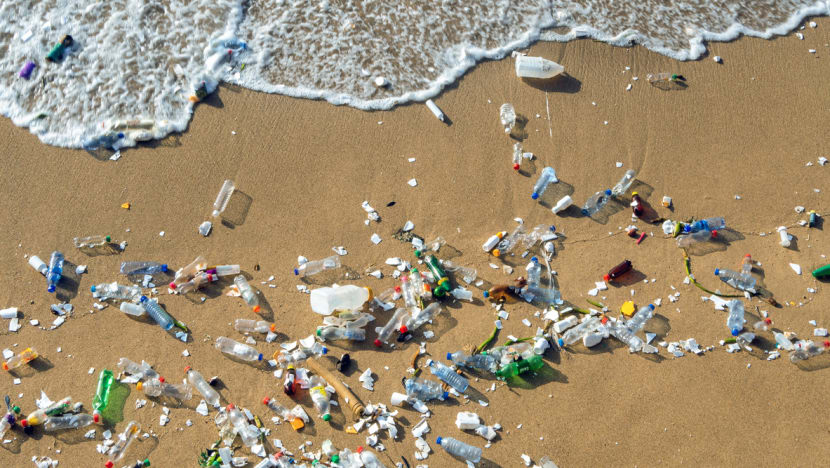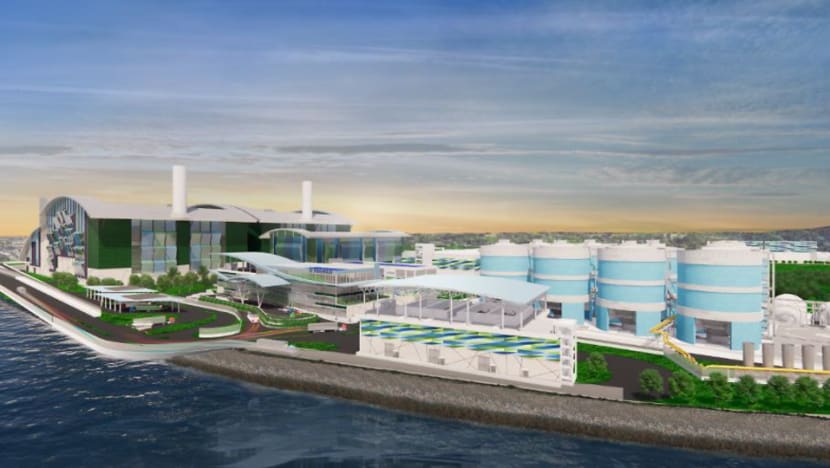New association launched to help enhance rate of recycling plastic waste in Singapore

File photo of plastic bottles by the beach. (Photo: iStock)
SINGAPORE: The newly launched Plastics Recycling Association of Singapore (PRAS) will enhance Singapore's capability in plastics recycling by bringing together various stakeholders to exchange knowledge and best practices on plastic waste management and recycling, said Minister for Sustainability and the Environment Grace Fu on Tuesday (Aug 17).
The association was officially inaugurated on Tuesday. Speaking at the launch of PRAS, Ms Fu outlined three areas of opportunities that it can harness.
First, PRAS will develop and expand Singapore's capabilities for plastic waste. One way of doing this is through a beverage container return scheme for packaging waste, she shared.
The scheme will hold producers, such as beverage companies, accountable for the collection and recycling of their beverage bottles. Consumers will get a refund when they return empty beverage containers at designated return points.
Ms Fu added that a PET bottle recycling facility in Singapore would be one way for PRAS to strengthen Singapore's local capability in recycling PET bottles. Such a facility will create economic value and green jobs locally, as well as bring expertise in areas like precision engineering, manufacturing of recycling equipment, and plastic recycling processes, she said.
PET stands for polyethylene terephthalate, a form of polyester. It is moulded into plastic bottles and containers for packaging foods and beverages, personal care products, and many other consumer products commonly used in Singapore.
Secondly, PRAS can explore new solutions in plastic waste recycling, collaborating with Singapore's "research and development ecosystem", said Ms Fu.
"For example, a team from A*STAR's Institute of Chemical and Engineering Sciences is developing a solution to recover PE and PET layers in multi-layered films, while a team from Temasek Polytechnic's Centre for Urban Sustainability is looking at processing mixed plastic waste into ingredients for building and construction applications," said Ms Fu.
Finally, she added that PRAS can create opportunities to bring about a "circular economy" beyond Singapore.
"Singapore is certainly not alone in recognising the need for a circular approach when using our resources," the minister said.
Ms Fu cited Malaysia's roadmap towards zero single-use plastics, and Indonesia's circular economy approach towards sustainable growth and development. Through bodies like PRAS, there are opportunities for Singapore to "accelerate the shift towards plastics circularity in our region", she said.
"While plastic is a critical component in our manufacturing and logistical processes, its impact on the environment cannot be ignored. The current business-as-usual mode cannot continue. The world is urgently in need of sustainable solutions to plastic waste," said Ms Fu.
PRAS president Edwin Khew said: "We're all stakeholders who are manufacturers of raw plastic material and pallets, producers of plastic products, consumers, collectors and recyclers of waste plastic ... and can be involved on a singular platform to help move the recycling needle of plastics from 4 per cent to 30 per cent and then to 70 per cent within the next five to 10 years.
"This will be PRAS' aspirational targets for plastic recycling in Singapore, which we hope to achieve with recycling technologies and new plastic technologies that we will be introducing into Singapore by Memorandums of Understanding (MOUs) we will be signing."
In a separate press release, PRAS said it has established the Plastics Recycling Centre of Excellence to find innovative solutions to address the "ubiquitous plastic waste in Singapore".
The centre aims to fast track and customise "leading edge solutions" to Singapore, then serve as a reference to facilitate ASEAN countries' own recycling projects, said PRAS.
The centre will sign five MOUs with different partners focusing on a range of skills training, and research and development collaborations to achieve a higher circularity of plastics.

WASTE MANAGEMENT FACILITY FINANCED BY GREEN BONDS
Ms Fu also announced that the new Tuas Nexus Integrated Waste Management Facility (IWMF) will be the first infrastructure project by a statutory board to be financed through green bonds.
The National Environment Agency has established a S$3 billion Multicurrency Medium Term Note Programme and a Green Bond Framework. Proceeds from the issuance of notes will be used to finance sustainable infrastructure projects, such as the IWMF, said the minister.
The Tuas Nexus facility will be Singapore's first integrated facility to treat incinerable waste, source-segregated food waste, and dewatered sludge.
"In Singapore, our amount of waste generated locally has increased sevenfold over the last 40 years. Our only landfill, the Semakau Landfill, will run out of space by 2035, based on the current waste disposal rate, even with incineration," said Ms Fu.
She added that Singapore generated 868,000 tonnes of plastic waste in 2020, with only 4 per cent being recycled, making plastic waste one of the country's "largest waste streams".
"It is clear we need a paradigm shift - to move from a linear approach of take, make and throw, to a circular one where waste becomes resource and is reused over and over again. And we need to move fast," she said.















